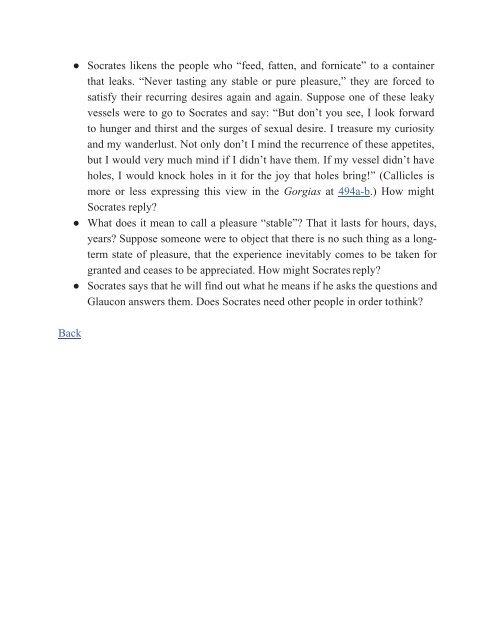The Intelligent Troglodyte’s Guide to Plato’s Republic, 2016a
The Intelligent Troglodyte’s Guide to Plato’s Republic, 2016a
The Intelligent Troglodyte’s Guide to Plato’s Republic, 2016a
Create successful ePaper yourself
Turn your PDF publications into a flip-book with our unique Google optimized e-Paper software.
Back<br />
Socrates likens the people who “feed, fatten, and fornicate” <strong>to</strong> a container<br />
that leaks. “Never tasting any stable or pure pleasure,” they are forced <strong>to</strong><br />
satisfy their recurring desires again and again. Suppose one of these leaky<br />
vessels were <strong>to</strong> go <strong>to</strong> Socrates and say: “But don’t you see, I look forward<br />
<strong>to</strong> hunger and thirst and the surges of sexual desire. I treasure my curiosity<br />
and my wanderlust. Not only don’t I mind the recurrence of these appetites,<br />
but I would very much mind if I didn’t have them. If my vessel didn’t have<br />
holes, I would knock holes in it for the joy that holes bring!” (Callicles is<br />
more or less expressing this view in the Gorgias at 494a-b.) How might<br />
Socrates reply?<br />
What does it mean <strong>to</strong> call a pleasure “stable”? That it lasts for hours, days,<br />
years? Suppose someone were <strong>to</strong> object that there is no such thing as a longterm<br />
state of pleasure, that the experience inevitably comes <strong>to</strong> be taken for<br />
granted and ceases <strong>to</strong> be appreciated. How might Socrates reply?<br />
Socrates says that he will find out what he means if he asks the questions and<br />
Glaucon answers them. Does Socrates need other people in order <strong>to</strong> think?


















